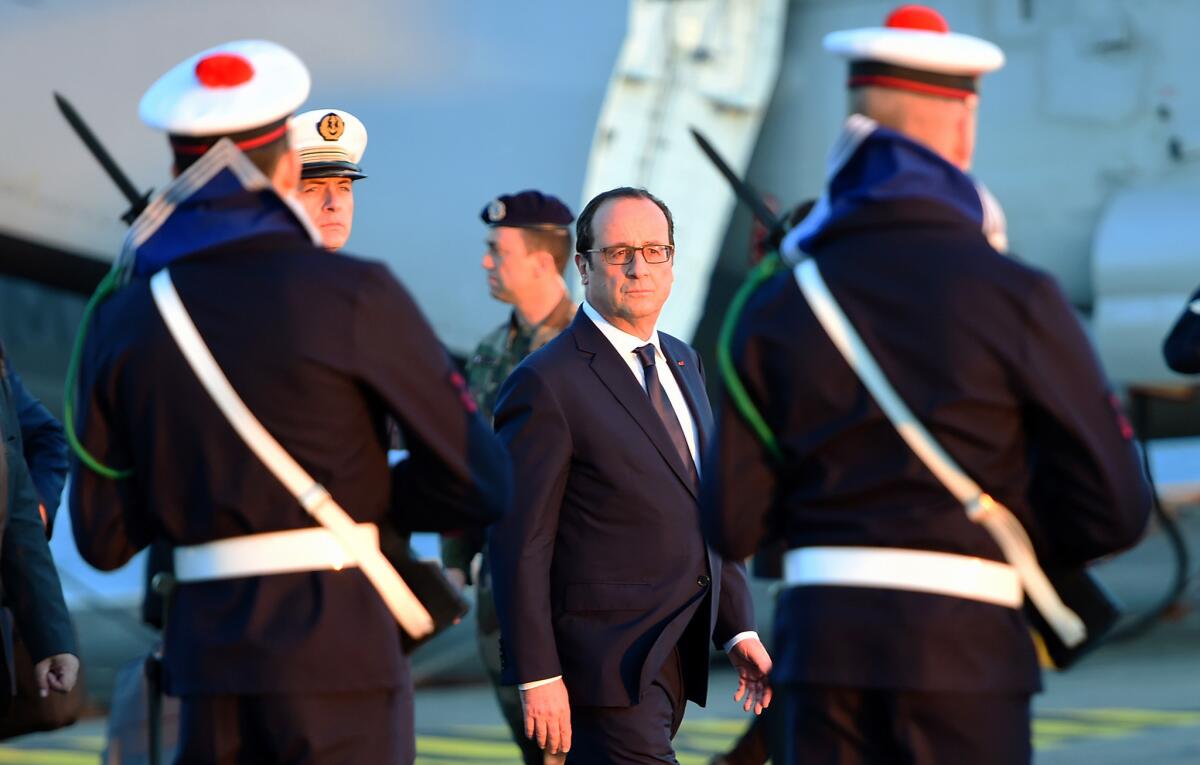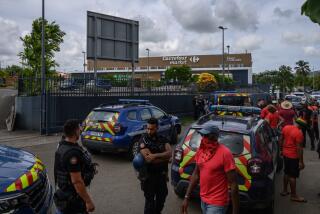France cracks down on hate speech

French President Francois Hollande visits the French aircraft carrier Charles de Gaulle on Wednesday. He announced that the carrier would be deployed to the Middle East to back the U.S.-led campaign against the Islamic State militant group.
- Share via
Reporting from Paris — French authorities tightened security Wednesday in response to last week’s terrorist attacks, ordering a crackdown on hate speech that backs terrorism and deploying the aircraft carrier Charles de Gaulle to support U.S.-led airstrikes in the Middle East.
Al Qaeda in the Arabian Peninsula, a Yemen-based militant group, claimed to have instigated the Jan. 7 attack on Charlie Hebdo magazine’s offices that left 12 dead, including eight staff members. Nasr Ansi, a top commander, said in a 12-minute video posted online that the raid was ordered to avenge the prophet Muhammad, who had been lampooned by the weekly.
French authorities issued an order to strictly enforce laws against voicing support for terrorist acts and disclosed that 54 people had been arrested for violating the prohibitions, initially adopted to deter and punish anti-Semitic remarks.
In a message to prosecutors and judges, the Interior Ministry said it was concerned about speech that could incite violence, noting no one should be allowed to use religion to justify such speech. The order warned authorities to especially watch for comments that could lead to urban unrest or violence against police.
Among those accused of speaking out in defense of last week’s attack at the satirical magazine was a controversial comedian, Dieudonne M’bala M’bala, news channel France 24 reported. He had tweeted that he felt as victimized as one of the gunmen, Amedy Coulibaly, 32, who took shoppers hostage at a kosher market Friday, killing four before he died in a police raid.
“Whenever I express myself some people will not even try to understand me, they will not listen,” the comic said in a letter to the interior minister. “They try to find some kind of pretext to suppress me. I am looked upon as if I were Amedy Coulibaly, when I am no different from Charlie.”
Even as Parisians snapped up the latest issue of Charlie Hebdo and spoke of the importance of free speech, many also said they support expanding surveillance and screening of suspected terrorists.
Alexandre Dupouy, 42, a tech consultant, said that by confronting Dieudonne, the government was confronting anti-Semitic hate speech.
“He can be very funny, but you feel behind his words, there is a real threat,” Dupouy said as he sat in a cafe late Wednesday.
He said he also supports expanded airport screening, wiretaps, and Internet and other surveillance, noting last week’s attackers had been monitored by police but police access was limited.
“You can’t control everything. You can’t prevent everything. But it will improve the situation,” he said of expanded surveillance.
His friend Mourad Chouardbi, 42, a fellow tech worker, agreed.
“Before the attacks people would not have accepted it. Now, people are realizing there are some loopholes that allow people to go under the radar” of police, said Chouardbi, who is Muslim and whose family comes from Algeria.
He said he doesn’t fear discrimination, racial profiling or undue infringements on his civil rights.
“If you want more security, you have to limit the liberty,” he said.
President Francois Hollande announced that he was dispatching the Charles de Gaulle during a visit to the carrier and its crew of 800, news agencies reported.
“Thanks to the Charles de Gaulle, we will have precious intelligence,” Hollande said as the carrier cruised in the Mediterranean. He said the warship’s fighter jets and coastal surveillance aircraft were also at the ready to conduct operations in Iraq, where a U.S.-led air campaign has been targeting militants of the Islamic State group that controls about a third of Iraqi and Syrian territory.
The French government also has deployed 10,000 soldiers and 120,000 security forces around France to protect airports, train stations, houses of worship and other high-traffic venues.
U.S. Secretary of State John F. Kerry is due in Paris on Friday for meetings with Hollande and other French leaders to discuss counter-terrorism strategy after the worst attack in France in decades. In addition to the four hostages at the kosher market, a policewoman also was killed after the magazine massacre, leaving 20 dead in the French capital over a three-day period, including the three gunmen.
Authorities have said they believe more accomplices may be at large, including Hayat Boumeddiene, 26, Coulibaly’s partner. Turkish officials have said she flew to Istanbul a week before the attacks and is believed to have fled to Syria.
Hennessy-Fiske reported from Paris and Williams from Los Angeles.
Follow @cjwilliamslat for the latest international news 24/7
More to Read
Sign up for Essential California
The most important California stories and recommendations in your inbox every morning.
You may occasionally receive promotional content from the Los Angeles Times.












